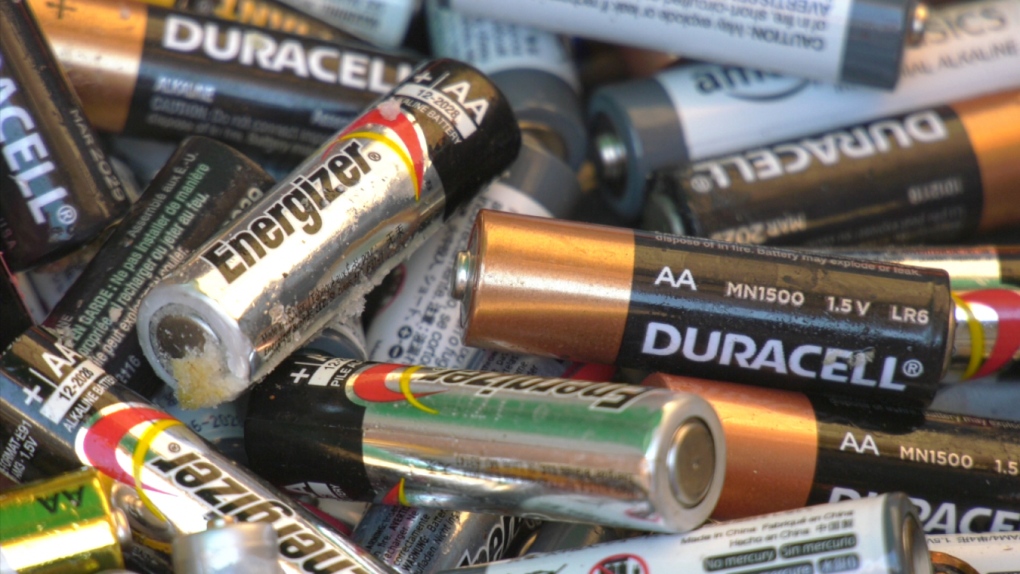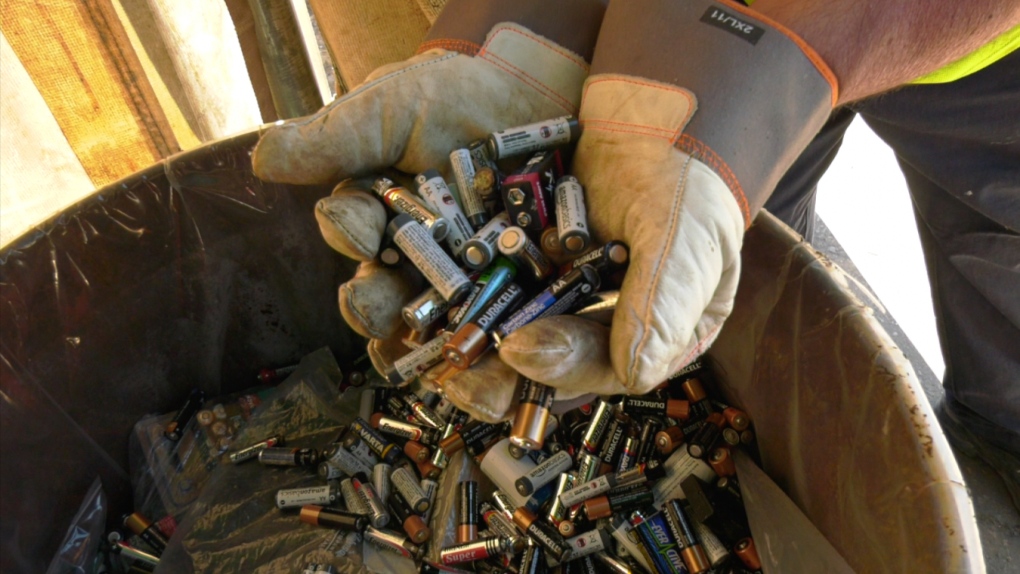North Bay leads the charge for properly recycling household batteries
When it comes to properly recycling batteries, no other community does it better than North Bay, Ont. The city picked up an award for its work in properly recycling dead batteries.
The city is a recipient of the ‘2023 Leader In Sustainability’ award from Call2Recycle Canada for its work in seeing dead batteries are properly disposed of.
 North Bay collected more than 13,300 kg of batteries to recycle in 2023. (Eric Taschner/CTV News Northern Ontairo)This award is granted each year to organizations that display exceptional commitment to battery recycling – this is the second time in as many years that North Bay has earned this distinction.
North Bay collected more than 13,300 kg of batteries to recycle in 2023. (Eric Taschner/CTV News Northern Ontairo)This award is granted each year to organizations that display exceptional commitment to battery recycling – this is the second time in as many years that North Bay has earned this distinction.
“It involves everyone from our youth in our community to families to staff having the services available to be able to recycle them,” said city councillor Lana Mitchell, the chairperson of the infrastructure and operations committee.
In 2021, North Bay collected over 6,500 kg of recycled batteries. Two years later, that number then doubled – contributing to a record-breaking year at Call2Recycle of batteries were diverted from Canadian landfills. The city collected more than 13,300 kg of batteries to recycle in 2023.
“The Call2Recycle program has managed to collect almost 6,000,000 kilos across Canada,” said Call2Recycle spokesperson Charles-Antoine Dubois in an interview with CTV News.
“Each year, Canadians recycle more and more of their used batteries.”
Dubois said however there is always room for improvement, which is why Call2Recycle is launching a new ad campaign.
“It aims to educate Canadians about the best practices of recycling batteries,” he said.
There are many benefits to recycling your batteries. Batteries contain toxic chemicals like cadmium, lead, lithium, or sulfuric acid. If not disposed of properly, they can leak into soil, ecosystems and waterways and potentially make their way into the food chain.
Batteries thrown in the garbage or in the landfill can even short-circuit, overheat and be a fire danger.
“A dead battery still holds a residual charge,” Dubois said.
“So it can pose a risk if it ends up in a garbage bin in contact with a metal object.”
Experts told CTV News that when properly recycled, household batteries can be used to make all sorts of products like stainless steel appliances, bicycles or golf clubs.
 The Household Hazardous Waste depot on Patton Street in North Bay has been collecting and shipping batteries for recycling for approximately 20 years. (Eric Taschner/CTV News Northern Ontario)Call2Reycyle has 11 battery drop-off locations in North Bay, with one of them being the Household Hazardous Waste depot on Patton Street, which has been collecting and shipping batteries for recycling for approximately 20 years.
The Household Hazardous Waste depot on Patton Street in North Bay has been collecting and shipping batteries for recycling for approximately 20 years. (Eric Taschner/CTV News Northern Ontario)Call2Reycyle has 11 battery drop-off locations in North Bay, with one of them being the Household Hazardous Waste depot on Patton Street, which has been collecting and shipping batteries for recycling for approximately 20 years.
“It doesn’t even have to cost a lot of money to have a huge impact and make a big difference,” Mitchell said.
“The support we receive from the City of North Bay helps us achieve our mission of maximizing battery diversion from the waste stream, which in turn protects wildlife, the environment and our communities.”
- Download the CTV News app now
- Get local breaking news alerts
- Daily newsletter with the top local stories emailed to your inbox
Next time you need to change the batteries in your smoke detector or from your TV remote, Dubois said the best thing to do is tape the ends for safety and store them in a non-metal container or zip lock bag and then drop them off at the nearest drop-off location the next time you’re out running errands.
CTVNews.ca Top Stories

Most of Canada to receive emergency alert test today
The federal government will test its capacity to issue emergency alerts today, with the exception of Ontario, where the test will take place on May 15.
'A huge difference': These adults born in the '90s partnered with their parents to buy homes in Ontario
An Ontario woman said it would have been impossible to buy a house without her mother – an anecdote that animates the fact that over 17 per cent of Canadian homeowners born in the ‘90s own their property with their parents, according to a new report.
OPINION No reunion between Prince Harry and the King signifies a setback for royal unity
Prince Harry, the Duke of Sussex, has made headlines with his recent arrival in the U.K., this time to celebrate all things Invictus. But upon the prince landing in the U.K., we have already had confirmation that King Charles III won't have time to see his youngest son during his brief visit.
Northern Ont. woman makes 'eggstraordinary' find
A chicken farmer near Mattawa made an 'eggstraordinary' find Friday morning when she discovered one of her hens laid an egg close to three times the size of an average large chicken egg.
How Drake and Kendrick Lamar's rap beef escalated within weeks
A long-simmering feud between hip-hop superstars Drake and Kendrick Lamar reached a boiling point in recent days as the pair traded increasingly personal insults on a succession of diss tracks. Here’s a quick overview of what’s behind the ongoing beef.
NEW For their protection, immigrants critical of China and India call for speedy passage of Canada's foreign interference legislation
Canadian immigrants threatened by hostile regimes are urging parliamentarians to quickly pass the 'Countering Foreign Interference Act' so they can feel safe living in their adopted home.
Ontario man devastated to learn $150,000 line of credit isn't insured after wife dies
An Ontario man found out that a line of credit he thought was insured actually isn't after his wife of 50 years died.
Spanish prosecutors recommend 2nd investigation into Shakira's taxes be thrown out
Spanish state prosecutors recommended Wednesday that an investigating judge shelve a probe into another alleged case of tax fraud by pop star Shakira.
Stormy Daniels describes meeting Trump during occasionally graphic testimony in hush money trial
With Donald Trump sitting just feet away, Stormy Daniels testified Tuesday at the former president's hush money trial about a sexual encounter the porn actor says they had in 2006 that resulted in her being paid to keep silent during the presidential race 10 years later.
































